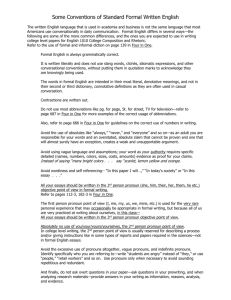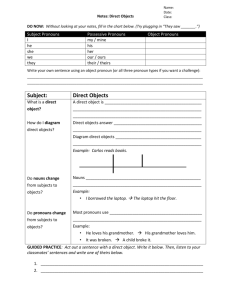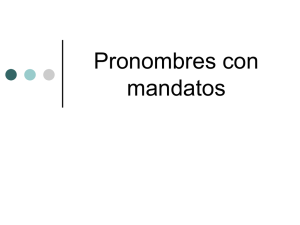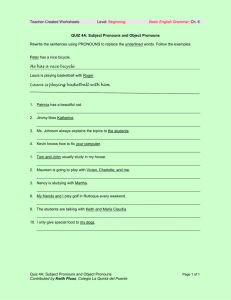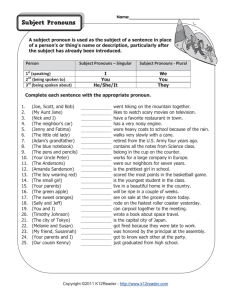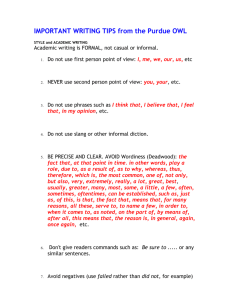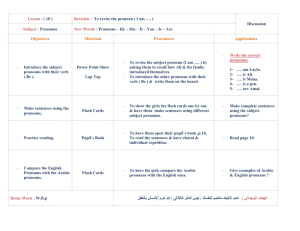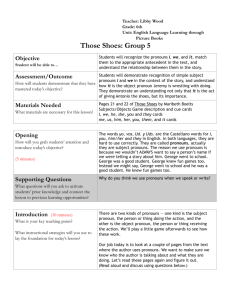Personal Pronouns in Academic Writing
advertisement
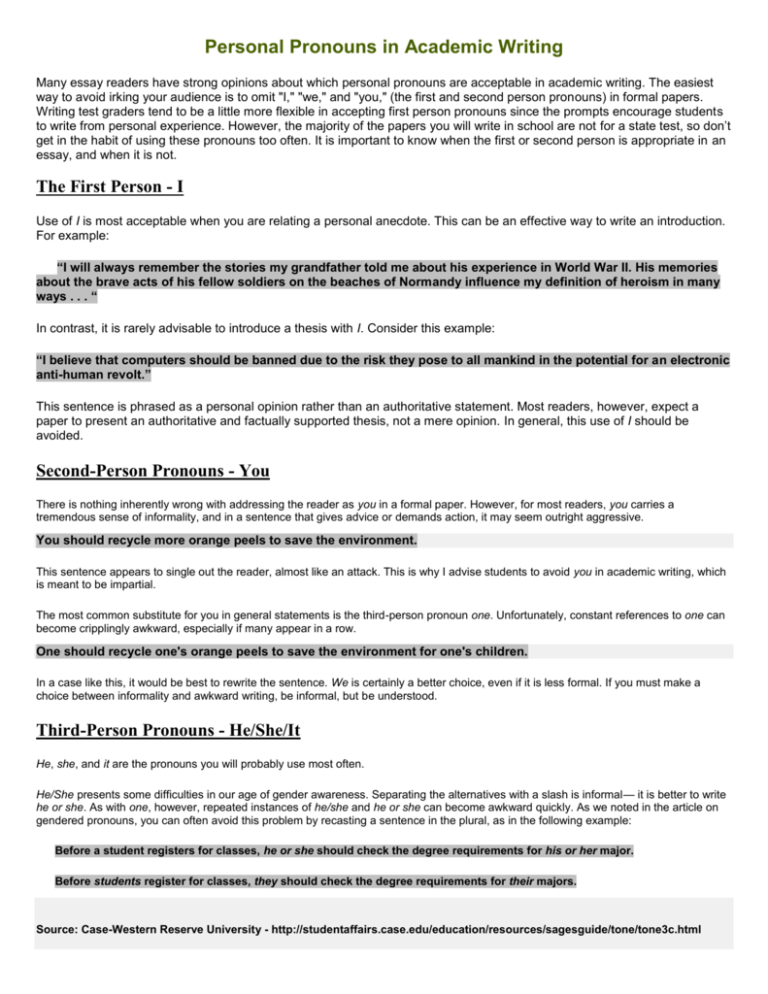
Personal Pronouns in Academic Writing Many essay readers have strong opinions about which personal pronouns are acceptable in academic writing. The easiest way to avoid irking your audience is to omit "I," "we," and "you," (the first and second person pronouns) in formal papers. Writing test graders tend to be a little more flexible in accepting first person pronouns since the prompts encourage students to write from personal experience. However, the majority of the papers you will write in school are not for a state test, so don’t get in the habit of using these pronouns too often. It is important to know when the first or second person is appropriate in an essay, and when it is not. The First Person - I Use of I is most acceptable when you are relating a personal anecdote. This can be an effective way to write an introduction. For example: “I will always remember the stories my grandfather told me about his experience in World War II. His memories about the brave acts of his fellow soldiers on the beaches of Normandy influence my definition of heroism in many ways . . . “ In contrast, it is rarely advisable to introduce a thesis with I. Consider this example: “I believe that computers should be banned due to the risk they pose to all mankind in the potential for an electronic anti-human revolt.” This sentence is phrased as a personal opinion rather than an authoritative statement. Most readers, however, expect a paper to present an authoritative and factually supported thesis, not a mere opinion. In general, this use of I should be avoided. Second-Person Pronouns - You There is nothing inherently wrong with addressing the reader as you in a formal paper. However, for most readers, you carries a tremendous sense of informality, and in a sentence that gives advice or demands action, it may seem outright aggressive. You should recycle more orange peels to save the environment. This sentence appears to single out the reader, almost like an attack. This is why I advise students to avoid you in academic writing, which is meant to be impartial. The most common substitute for you in general statements is the third-person pronoun one. Unfortunately, constant references to one can become cripplingly awkward, especially if many appear in a row. One should recycle one's orange peels to save the environment for one's children. In a case like this, it would be best to rewrite the sentence. We is certainly a better choice, even if it is less formal. If you must make a choice between informality and awkward writing, be informal, but be understood. Third-Person Pronouns - He/She/It He, she, and it are the pronouns you will probably use most often. He/She presents some difficulties in our age of gender awareness. Separating the alternatives with a slash is informal— it is better to write he or she. As with one, however, repeated instances of he/she and he or she can become awkward quickly. As we noted in the article on gendered pronouns, you can often avoid this problem by recasting a sentence in the plural, as in the following example: Before a student registers for classes, he or she should check the degree requirements for his or her major. Before students register for classes, they should check the degree requirements for their majors. Source: Case-Western Reserve University - http://studentaffairs.case.edu/education/resources/sagesguide/tone/tone3c.html Review the following sentences, taken from student responses to the underage drinking prompt. Revise the pronoun choice in the sentence. You may have to re-write the sentence and address general “wordiness.” 1. “When you are a teen, your social health is very important.” __________________________________________________________________________________________ __________________________________________________________________________________________ 2. “When you set your mind to the fact that you can depend on alcohol you lose focus on the real things that matter in life.” __________________________________________________________________________________________ __________________________________________________________________________________________ 3. “If a teen has a criminal charge on your record, that could hurt your chances of getting a job that you may want. Legal charges can really hurt your lifestyle.” __________________________________________________________________________________________ __________________________________________________________________________________________ 4. “Having a criminal record can make it hard to get into college and get a good job. This makes it hard to prepare for the future in a responsible way. It is also known that if you have a record, a judge won’t be quite as lenient.” __________________________________________________________________________________________ __________________________________________________________________________________________ Beyond problems with personal pronouns, essay readers also see a problem with vague pronoun references. Beginning a sentences with a vague demonstrative pronoun (this, that, those) or indefinite pronoun (many, some) can be confusing. Revise the vague pronoun use in the following sentences. 1. While terrifying, hungry space aliens were holding the class hostage, Mr. Parker announced that the research essays were due early—on Friday, not Monday. This really distressed the poor students. 2. I hate driving my brother’s truck because it always breaks down when you are in the middle of a busy intersection. 3. It says in the syllabus that Prof. Duncan won’t tolerate tardiness, but we were not surprised to see Will peeking through the classroom window, hoping that he could enter late once again. 4. At the top of Mt. Everest, the highest peak in the Himalayas, you must find the stamina, supplies, and good luck to make the trip back down to base camp. 5. Because of the category 5 hurricane, all of Central Florida had lost electrical power, so Mike couldn't watch the Nightmare on Elm Street marathon on HBO. That really bothered him. 6. My dependable car, who has taken me over 120,000 miles, still has a smoothly purring engine. 7. Being an astronaut is a difficult career. You have to tolerate days in space without a shower. 8. The car passengers were blasting music and throwing recyclable aluminum soda cans out the windows. It really upset Erin, who drove behind them. 9. Cisco loves the mythological stories from ancient Egypt, so he plans to study even more of it during summer break. 10. Clarence always brings a tape recorder to class because you never know when Dr. Wilson will drop an important clue about the next chemistry test. Test your understanding of shifts in person by rewriting each of the following sentences correctly. 1. Everyone should leave your offices by 5 pm. 2. If a student has questions about writing, you can contact us. 3. I feel that people should have the right to emergency health care if you need it. 4. I once thought that a monster lived under my bed, but now we no longer believe that. University of Houston-Victoria Writing Center http://www.uhv.edu/ac/newsletters/writing/grammartip2006.11.07.htm
